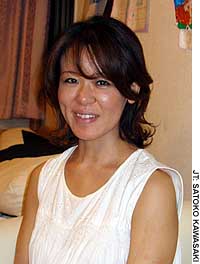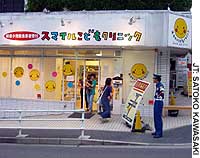Vital need for pediatricians
converted pair
Son's survival amid shortage led
psychiatrists to find new, 24-hour calling
By SETSUKO
KAMIYA
Staff writer
Ten years ago, when Dr. Yukari
Kato's second child was born seven weeks premature, all she could do was pray he
would survive. Happily, after time in a hospital intensive-care unit, he did,
and this month he turns 11.
 |
| Pediatrician Yukari Kato and her husband operate Smile
Children's Clinic in Yokohama's Totsuka district, providing round-the-clock
primary care for children. SETSUKO KAMIYA PHOTOS |
 |
Kato had been working as a psychiatrist in Tottori Prefecture for five years
at the time, but the experience became a turning point in her career. A year
after her son's birth, she switched to pediatrics, determined to devote herself
to saving the lives of children.
"I was so thankful that my son was saved and became healthy, but it didn't
feel right just being happy about my own child," she said.
In fact, it was a family feeling, as her 39-year-old husband, Takashi, who
back then also was a psychiatrist, changed career paths for much the same reason
as his spouse.
Initially, Kato hoped to carry out pediatric work in refugee camps overseas.
But during her training at a hospital in Osaka, she realized there was a dire
need for qualified pediatricians right at her doorstep.
"All through the night in the emergency room, there were so many parents
desperate for their children to be treated. Many even came from outside the
prefecture because they had nowhere else to go. The sight reminded me of a
refugee camp," she said.
What she saw was by no means unique. In terms of emergency pediatric care, it
was close to the norm nationwide. The overriding problem was that few
pediatricians handle patients after hours, resulting in packed emergency rooms
wherever they are on 24-hour call.
In addition, more and more babies are born into nuclear families. Thus with
little child-rearing support from extended family members, the pressure on
hospital services continues to grow as clueless parents seek emergency care for
trivial ailments that could wait until morning to be handled by family doctors.
Adding to this pressure on hospitals are the increasing number of full-time
working mothers who are unable to take their children to hospitals or clinics
during the day.
Despite the increase in demand, however, the number of family pediatricians
who accept patients at night is falling. This is in part because many clinics
are in office buildings that are only open during normal working hours -- and
also partly because pediatrics is less profitable than many other areas of
medicine, especially when it comes to minor problems after hours.
This scarcity of pediatricians and the high demand for them has resulted in
numerous, often avoidable, tragedies, including cases in which children have
died while being shuttled between hospitals in search of a pediatrician.
The shortage inevitably puts a tremendous strain on ER pediatricians, many of
whom end up working incredibly long hours. In 1999, a Tokyo pediatrician's
suicide was blamed on stress from overwork, as well as on pressure from
management to improve profits.
A decade ago, back when Kato was switching to pediatrics, the national
emergency pediatrics care problem became enough of a social concern to prompt
discussions by clinicians and the government on how to improve it. Despite the
high-level dialogue, however, Kato decided not to wait for a national change and
acted on her own.
"It's easy to blame the government or hospitals, or even mothers who bring
children who are not at risk," she said. "But if we had the opportunity to do
something ourselves, I thought we should do it."
With that thought in mind, Kato resolved to build a more accessible facility
where mothers could take their children for medical help.
In August 2001, she and her husband set up Smile Children's Clinic in the
Totsuka area of Yokohama to provide round-the-clock primary care for minors
every day of the year.
In the past four years, the couple have treated a combined average of 10,000
patients a year in their 37-sq.-meter clinic, which has only two consulting
rooms.
In most cases, Kato said, the young patients' conditions are not
life-threatening, but in the event of an emergency the clinic ensures a speedy
transfer to a bigger hospital with adequate facilities.
Pediatricians observing the clinic say the Katos' practice is not only
benefiting many children, and saving lives, but is also helping to reduce the
burden on night-duty doctors in bigger hospitals, allowing them to focus on
treating severe cases.
To meet similar demands in other areas, in 2003 the Katos launched a branch
of Smile Children's Clinic in Matsumoto, Nagano Prefecture, followed by one in
Urayasu, Chiba Prefecture, which opened this June.
Their clinics now employ a combined eight full-time pediatricians, including
themselves, but receive part-time support from some 20 others who are based in
hospitals but share their concern.
The nationwide outlook for emergency pediatric care got a little brighter
last year when the percentage of payments that pediatricians can claim for
patient medication from health insurance unions was raised. As a result, more
clinics and hospitals have begun working together to provide after-hours service
for children.
A dramatic improvement, however, remains elusive.
"I really hope the day will come when our clinic doesn't need to exist," Kato
said. As long as there's a need, however, she's willing to continue opening new
branches.
The Japan Times: Aug. 16, 2005
(C) All rights
reserved
|